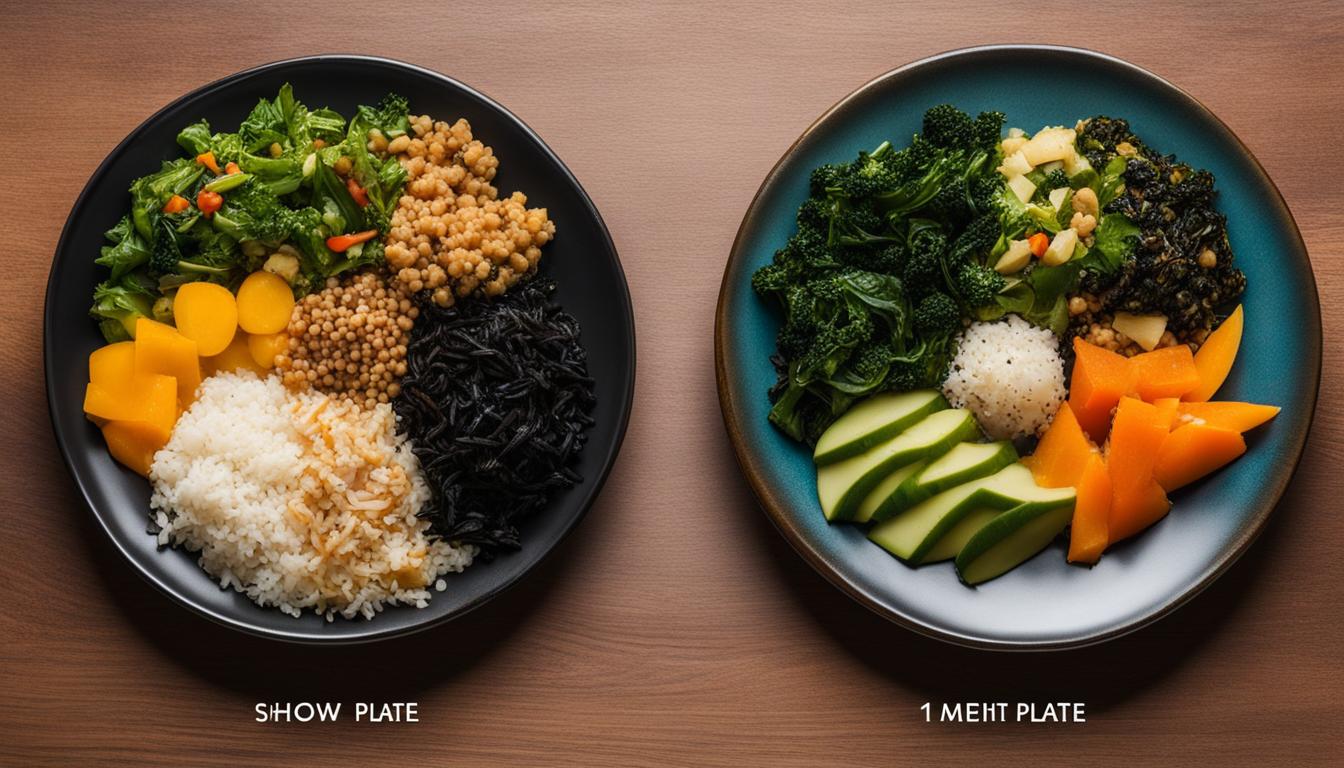Are you considering adopting a vegetarian lifestyle? It’s important to understand the different types of vegetarian diets and their variations. In this article, we will explore the differences between two popular vegetarian diets: lacto-ovo vegetarian and lacto vegetarian.
A lacto-ovo vegetarian diet includes dairy products and eggs, making it a more flexible option for those who still want to enjoy these animal-based foods. On the other hand, a lacto vegetarian diet excludes eggs but includes dairy products. Both diets are centered around plant-based foods, but the exclusion or inclusion of eggs can make a significant difference.
Key Takeaways:
- Lacto-ovo vegetarians include dairy products and eggs in their diet.
- Lacto vegetarians exclude eggs but include dairy products.
- Both diets are plant-based and offer health benefits.
- Lacto-ovo and lacto vegetarian diets can be achieved while meeting nutritional needs.
- Consider your personal preferences and nutritional requirements when choosing a vegetarian diet.
Understanding the Different Types of Vegetarian Diets
When it comes to vegetarian diets, there are various types that individuals may choose to follow based on their preferences and beliefs. Each type has its own set of guidelines and restrictions. Let’s take a closer look at the different types of vegetarian diets:
Lacto-Vegetarian:
Lacto-vegetarianism is a type of vegetarian diet that excludes meat, fish, poultry, and eggs, but includes dairy products. This means that individuals following a lacto-vegetarian diet can consume foods such as milk, cheese, yogurt, and butter. By excluding eggs and meat from their diet, lacto-vegetarians are able to enjoy the benefits of a plant-based lifestyle while still incorporating dairy products.
Pescatarian:
Pescatarians follow a primarily vegetarian diet but also include fish and other seafood in their meals. This means that pescatarians do not consume meat or poultry but still allow themselves to enjoy the nutritional benefits of seafood. By incorporating fish into their diet, pescatarians can benefit from the omega-3 fatty acids and other nutrients found in fish.
Flexitarian:
Flexitarians, also known as semi-vegetarians, follow a flexible approach to their diet. They primarily follow a vegetarian diet but occasionally consume meat, fish, or poultry. Flexitarians focus on plant-based foods but allow themselves the flexibility to include animal products on occasion. This allows individuals to enjoy the health benefits of a vegetarian diet while still having the option to include meat in their meals from time to time.
By understanding the different types of vegetarian diets, individuals can make informed decisions about their dietary choices. Whether someone chooses to follow a lacto-vegetarian, pescatarian, flexitarian, or another type of vegetarian diet, it’s important to ensure that they are meeting their nutritional needs and incorporating a variety of plant-based foods in their meals.
Benefits of Being a Lacto-Ovo Vegetarian
Eating a lacto-ovo vegetarian diet can offer various benefits for your health and well-being. By including dairy products and eggs in your diet, you can ensure a sufficient intake of essential nutrients like calcium and protein. These nutrients play vital roles in supporting overall health and can be more easily obtained for lacto-ovo vegetarians compared to other types of vegetarians.
Calcium is essential for maintaining strong bones and teeth, as well as supporting proper muscle and nerve function. Dairy products, such as milk, yogurt, and cheese, are excellent sources of calcium. By including these in your lacto-ovo vegetarian diet, you can meet your daily calcium requirements without relying solely on plant-based sources.
Protein is a crucial macronutrient that is necessary for building and repairing tissues, producing enzymes and hormones, and supporting a healthy immune system. Eggs are a complete source of protein, providing all nine essential amino acids. Including eggs in your lacto-ovo vegetarian diet can help ensure that you obtain an adequate amount of protein.
Vitamins and Minerals
In addition to calcium and protein, lacto-ovo vegetarians also benefit from a wide range of vitamins and minerals found in plant-based foods. Fruits, vegetables, legumes, whole grains, nuts, and seeds are all rich in vitamins and minerals, including vitamin C, vitamin E, folate, potassium, and magnesium. These nutrients are important for maintaining overall health and reducing the risk of chronic diseases.
Lacto-ovo vegetarian diets have been associated with a lower risk of developing chronic conditions such as diabetes and heart disease. This may be due to the high intake of fiber, antioxidants, and phytochemicals found in plant-based foods, as well as the lower intake of saturated fat and cholesterol typically associated with meat-based diets.
| Nutrient | Recommended Daily Intake | Food Sources |
|---|---|---|
| Calcium | 1000-1200 mg | Dairy products, fortified plant-based milk, leafy greens |
| Protein | 46-56 grams | Eggs, dairy products, legumes, tofu, tempeh, seitan |
| Vitamin C | 75-90 mg | Citrus fruits, berries, kiwi, peppers, broccoli |
| Vitamin E | 15 mg | Nuts, seeds, vegetable oils, leafy greens |
| Folate | 400-600 mcg | Leafy greens, legumes, fortified grains, citrus fruits |
| Potassium | 2500-3500 mg | Bananas, potatoes, spinach, avocado, beans |
| Magnesium | 310-420 mg | Legumes, nuts, seeds, whole grains, leafy greens |
By following a well-planned lacto-ovo vegetarian diet and ensuring adequate nutrient intake, you can enjoy the numerous health benefits associated with vegetarianism while maintaining a balanced and nutritious lifestyle.
Differences in Nutritional Considerations
When following a vegetarian diet, it is important to pay attention to certain nutritional considerations to ensure optimal health. Vegetarians, especially vegans, may need to be mindful of vitamin B12 deficiency, calcium intake, and sources of iron.
Vitamin B12 Deficiency
Vitamin B12 is essential for the production of red blood cells and the functioning of the nervous system. It is primarily found naturally in animal products, making it a nutrient of concern for vegetarians, particularly vegans who avoid all animal-based foods. To meet their vitamin B12 needs, vegans should consider taking a B12 supplement or consuming fortified foods such as plant-based milks, breakfast cereals, and nutritional yeast.
Calcium Intake for Vegetarians
Calcium is vital for strong bones and teeth, and dairy products are a common source of this mineral. However, for lacto-ovo vegetarians who consume dairy products, meeting calcium needs is less of a concern. They can rely on milk, cheese, yogurt, and other dairy alternatives fortified with calcium. For vegans who avoid dairy, calcium can be obtained from fortified plant-based milks, tofu, tempeh, leafy greens like kale and broccoli, and calcium-set tofu.
Iron Sources for Vegetarians
Iron is important for the production of red blood cells and maintaining optimal energy levels. While iron is abundant in meat, vegetarians can still obtain sufficient iron from plant-based sources. Good sources of iron for vegetarians include fortified cereals, legumes such as lentils and chickpeas, tofu, tempeh, quinoa, nuts, and seeds. It is important to consume iron-rich foods along with vitamin C-rich foods, like citrus fruits or tomatoes, to enhance iron absorption.

Impact on the Food Market
The rise in popularity of plant-based diets has had a significant impact on the food market. As more people adopt vegetarian and vegan lifestyles, the demand for plant-based food products has surged. This shift in consumer preferences has led to a decline in the consumption of traditional dairy products.
One of the key factors driving this trend is the increasing availability of vegan alternatives to animal-based foods. A variety of vegan egg brands, such as Follow Your Heart VeganEgg and JUST Egg, have emerged as popular choices among those looking to replace traditional eggs in their diet. These vegan egg products are made from plant-based ingredients and offer a similar taste and texture to their animal-based counterparts.
In addition to vegan eggs, the market is also witnessing the growth of vegan dairy brands. Brands like Oatly and Ripple have gained popularity for their plant-based milk alternatives, which are made from sources such as oats and peas. These products provide a dairy-free alternative for individuals who choose to avoid animal products.
Vegan Cheese Brands
Another segment that has seen significant growth is the vegan cheese market. Brands like Miyoko’s Creamery and Daiya offer a wide range of vegan cheese products made from plant-based ingredients such as nuts and soy. These vegan cheese alternatives are becoming increasingly popular among consumers who are looking for dairy-free options without compromising on taste.
The rise of plant-based foods has not only affected the dairy industry but also opened up new opportunities for businesses in the food market. As more consumers embrace vegetarian and vegan lifestyles, it is likely that the plant-based foods market will continue to expand, offering a wider variety of options for those looking to incorporate more plant-based products into their diet.
Health Considerations and Research
Research suggests that a vegetarian or vegan diet may have several health benefits and potentially reduce the risk of certain diseases. Let’s explore some of the findings related to vegetarian diets and their impact on cancer risk, diabetes risk, heart disease risk, and BMI levels.
Cancer Risk:
Studies have shown that following a vegetarian or vegan diet rich in plant-based foods, such as fruits, vegetables, whole grains, and legumes, may help lower the risk of certain types of cancer. These foods are packed with fiber, vitamins, minerals, and antioxidants that have been associated with decreased cancer risk. However, it’s important to note that more research is needed to fully understand the specific mechanisms and potential benefits.
Diabetes Risk:
Adopting a vegetarian or vegan diet has been linked to a reduced risk of type 2 diabetes. Plant-based diets tend to be lower in saturated fat and higher in fiber, which may contribute to improved insulin sensitivity and blood sugar control. Furthermore, plant-based diets often lead to a healthier weight, which is also associated with a lower risk of developing diabetes.
Heart Disease Risk:
Evidence suggests that vegetarian diets, particularly those that are low in saturated fat and high in fruits, vegetables, whole grains, and legumes, can help lower the risk of heart disease. These diets are naturally low in cholesterol and saturated fat, which are key contributors to cardiovascular problems. Additionally, plant-based diets have been shown to improve lipid profiles, blood pressure, and inflammation markers associated with heart disease.
Lower BMI:
Vegetarians, including lacto-ovo vegetarians, tend to have lower body mass index (BMI) levels compared to non-vegetarians. This may be due to the higher fiber content in plant-based diets, which promotes satiety and helps control calorie intake. Additionally, plant-based diets often provide fewer calories from fat and a higher nutrient density, which can contribute to weight management and a healthy BMI.
While these findings highlight potential benefits of vegetarian diets, it’s important to note that individual results may vary. It’s always recommended to consult with a healthcare professional or registered dietitian to ensure that your nutritional needs are being met when adopting a vegetarian or vegan lifestyle.
Conclusion
In conclusion, the main difference between a lacto-ovo vegetarian and a lacto vegetarian is the inclusion or exclusion of eggs in their respective diets. While lacto-ovo vegetarians consume dairy products and eggs, lacto vegetarians exclude eggs but include dairy products. Both types of vegetarian diets offer numerous benefits for health and well-being.
Choosing a vegetarian lifestyle can contribute to a lower risk of chronic diseases such as diabetes and heart disease. Additionally, vegetarian diets can help individuals maintain a healthy weight and lower their blood pressure levels. These positive effects are attributed to the abundance of fiber, vitamins, minerals, and plant compounds found in plant-based foods.
However, it’s important for vegetarians to consider meeting their nutritional needs. Certain nutrients, such as vitamin B12, calcium, iron, and zinc, may require special attention. Vegans in particular should be aware of the need for vitamin B12 supplementation or consumption of fortified foods. Calcium can be obtained from dairy alternatives and specific plant-based sources, while iron can be found in fortified cereals, legumes, and leafy greens.
By incorporating a variety of plant-based foods and potentially supplementing specific nutrients, individuals can successfully follow a lacto-ovo or lacto vegetarian diet while meeting their nutritional needs. Informed choices and a balanced approach can help individuals experience the many benefits of vegetarianism while maintaining optimal health.
FAQ
How does a lacto-ovo vegetarian differ from a lacto vegetarian?
A lacto-ovo vegetarian includes dairy products and eggs in their diet, while a lacto vegetarian excludes eggs but includes dairy products.
What are the different types of vegetarian diets?
Vegetarian diets range from veganism, which excludes all animal-based foods, to lacto-vegetarianism, which excludes meat and eggs but includes dairy products. Pescatarians allow themselves to eat fish while excluding other meats. Flexitarians follow a primarily vegetarian diet but occasionally consume meat.
What are some benefits of being a lacto-ovo vegetarian?
Lacto-ovo vegetarians have an easier time maintaining calcium and protein levels due to the inclusion of dairy products and eggs in their diet. Vegetarian diets, in general, are associated with a lower risk of chronic diseases such as diabetes and heart disease.
What are the nutritional considerations for vegetarians?
Vegetarians, especially vegans, may need to pay attention to getting enough vitamin B12, calcium, iron, and zinc in their diets. Vitamin B12 is found naturally in animal products, so vegans may need to supplement or consume fortified foods. Calcium can be obtained from dairy alternatives and certain plant-based foods. Iron sources include fortified cereals, legumes, and leafy greens.
How has the vegetarian diet impacted the food market?
The plant-based foods market is growing, while the consumption of dairy products is declining. There are now numerous vegan alternatives available, including vegan egg brands like Follow Your Heart VeganEgg and JUST Egg, vegan dairy brands like Oatly and Ripple, and vegan cheese brands like Miyoko’s Creamery and Daiya.
What does research say about the health impact of a vegetarian diet?
Research suggests that a vegetarian or vegan diet may lower the risk of certain diseases, including type 2 diabetes and heart disease. Vegetarian diets rich in fiber, vitamins, minerals, and plant compounds may have protective effects against cancer. Vegetarians also tend to have lower body mass index (BMI) and lower blood pressure levels compared to non-vegetarians.
What is the conclusion regarding lacto-ovo and lacto vegetarian diets?
In summary, a lacto-ovo vegetarian diet includes dairy products and eggs, while a lacto vegetarian diet excludes eggs. Both types of vegetarian diets have health benefits and can be achieved while meeting nutritional needs by incorporating a variety of plant-based foods and potentially supplementing specific nutrients. Taking these factors into account can help individuals make informed decisions about their dietary choices.
 Skip to main content
Skip to main content


